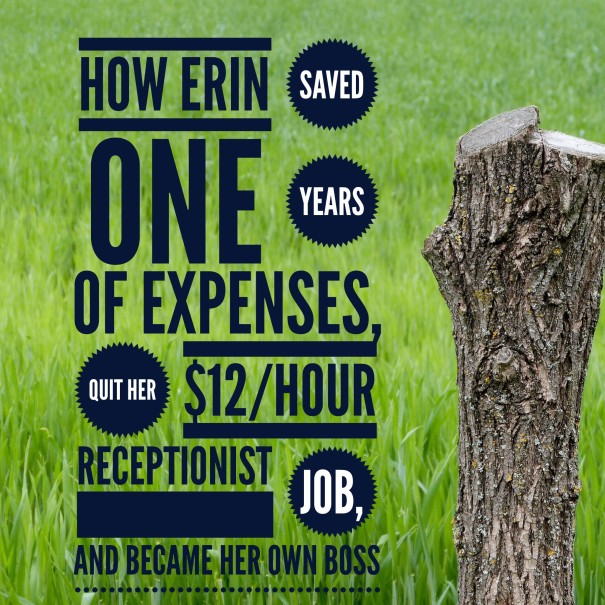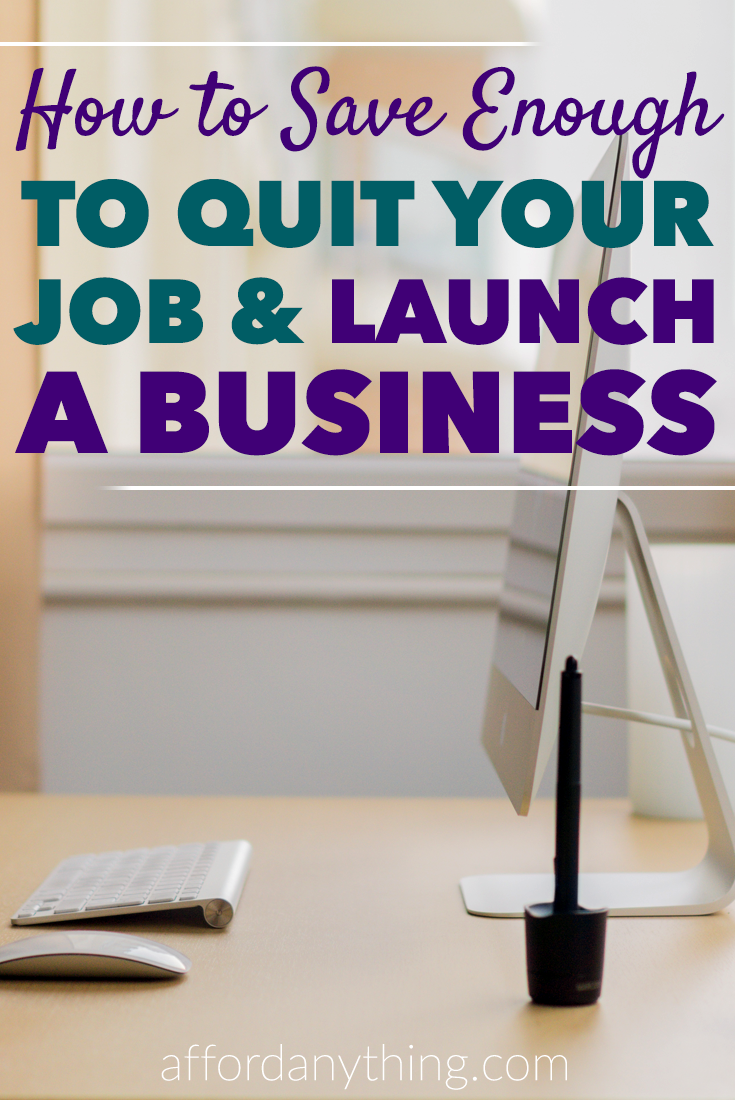
“I only earn enough to make the minimum payment on my loans.”
“My boss doesn’t pay me enough, so I can’t save a dime.”
“I’d love to quit my job, but I don’t think that’s realistic.”
The Naysayer Brigade makes statements like the examples above — statements that give power to their bosses and the economy, while demoralizing themselves.
Most of the fighters in Afford Anything’s rebellion understand that you’re the only person who can change your own life. You can afford anything — not everything, but anything. You can boost your income by an extra $500 or $2,500 or $5,000 per month. You can ignore the naysayers who’d rather blame their boss than take matters into their own hands.
To fuel the fires of rebellion, I’d like to introduce you to another success story: a longtime Afford Anything reader named Erin who quit her low-paying job, moved to a lower-cost-of-living area and launched her own business. Is she a millionaire? No. But she enjoys greater freedom, more flexibility, better career control and lower bills than ever before.
A few years ago, Erin used to earn $12 per hour. Despite her then-low pay, she committed to building a mountain of savings, and afterwards, for dessert, she flung her spare money towards her student loans. She lived in a basement apartment, rarely dined at restaurants (once or twice a month, if not less), and committed to building a shatterproof financial foundation.
To phrase it bluntly: Erin was determined.
Her emergency fund came in handy a few years later, when Erin decided to escalate her “side hustle” into a full-time calling. Like all risk-takers and adventurers, she had no idea if her idea would work out, but this cash cushion allowed her to embrace a career risk — one that’s paid off.
Fellow Rebels, meet Erin.
#1: Let’s start at the beginning: Tell us about your early career.
I graduated college with a B.S. in Criminal Justice. I lived on Long Island in New York, and the police department there is one of the highest paid in the nation.
Unfortunately, that meant that I faced tons of competition, so I sadly didn’t use my degree at all.
I had aspirations to become a forensic psychologist, but that required a masters degree, and I didn’t want to put myself into further student loan debt. I decided to take the first full-time job I could get after I graduated.
#2: Tell us about your first job.
When I initially applied to my first job, I was told it would be an executive administrative role. It turns out it was customer service. I left after 6 months because the job description didn’t match my actual duties at all. I raised my concerns and kept getting strung along with, “Oh, we’ll train you on this soon.” I was salaried and making the equivalent of $12 per hour.
#3: You hard-core committed to building an emergency fund. Why?
My parents were in debt, and they didn’t have any savings. I saw how severely this impacted them. Any time something broke in the house, they were frantic, as they couldn’t afford to repair it. I never wanted to end up in that situation — I wanted to make sure I could handle all the curveballs life could throw at me.
#4: Until recently, you lived in a 700 sq. ft. basement apartment in Long Island.
Yes. The basement apartment I lived in was located in classic suburbia. I lived underneath my landlord in a 2-story family home and paid $1,250 per month in rent. I never thought I’d live in a basement apartment, but thankfully, this one was newly constructed and it had a decent layout, even if it was small. It wasn’t dark, dank, or musty as you might expect a basement to be.
#5: Living on a tight budget, what did you do for fun?
I’m lucky to have friends who are fairly budget-conscious and love to have game nights and potlucks. The beach was also very close, and it was $10 for parking. Taking walks is also fun. I try to limit dining out to once or twice a month, if that. I’m not a foodie by any means.
#6: After you built an emergency fund, repaying your student loans became the next big priority. Why?
One day my fiancé and I were taking a walk, talking about our future, when we realized the implications of paying the minimum on our student loans. The thought of still paying them back 8 years from that point was depressing.
When I got home from the walk, I did the math and saw how much interest was costing me. That motivated me to prioritize getting rid of my student loans.
I hopped online and started searching for others who had succeeded at paying off their debt. That’s how I stumbled into the personal finance community. I found their stories inspirational.
#7: How did this all culminate in moving to North Carolina?
I always knew I wanted to get out of New York. Long Island, while not Manhattan, is still very expensive, and it just wasn’t worth the price to live there.
My fiancé took a full-time job at a company where relocation was necessary. He had to wait a year to be eligible for a promotion, at which point we could move. We planned on moving to a lower cost of living city, but we didn’t know what openings would be available until that first year came to a close. When he was finally ready for his promotion, Charlotte was on the list, and I had heard great things about it, so we gave it a shot.
#8: Why did you decide to try self-employment?
I found myself pigeon-holed into entry-level administrative positions, which didn’t pay very well. I figured it was worth a shot at making more by being my own boss and setting my own rates. (And being a receptionist wasn’t very fulfilling to me.)
I was inspired and encouraged by all my “blog friends” that had made the jump and succeeded. I had a sizable emergency fund to cover me, so there wasn’t much to lose. I figured if I didn’t get a hang of things in the first six months, I’d go back to the traditional workforce.
It’s important to note I wasn’t doing it alone, since my fiancé was still earning an income. We were essentially living off one income plus my savings for a few months last year. That allowed me to take my time to grow my business the right way.
#9: How did you land your first client?
My first client was a fantastic fellow personal finance blogger named Kali Roberge, who had recently quit her day job and transitioned to working for herself. She knew I had been searching for work and graciously took me under her wing.
Basically, I put myself out there. I made it known that I wanted to be a freelance writer. Kali and I had connected months before that because I loved her blog (still do!) and commented on just about every post of hers. Additionally, Cat Alford, who was my writing coach, referred me a number of clients as well.
Word of mouth is extremely powerful, and it also helped that I had a blog of my own to showcase my writing and skills.
{Note from Paula — Check out this guide to starting a blog in 5 minutes.}
#10: How did this impact your income?
I’m making more than I was at my previous job, before tax.
After tax, according to my estimations, I’m hovering around what I was getting paid before. It took about 6 months to get to that point. I also get to enjoy more flexibility and freedom, which is far more valuable to me. And I know my income potential is higher.
#10: How do you avoid “racing to the bottom” in terms of prices? In other words, how do you charge what you’re worth?
That’s a common problem. I hate hearing about people under-pricing themselves. There are people out there who are willing to pay your price, you just have to have the confidence and skills to back it up!
My advice is to figure out what you need to charge to be able to pay the bills, and work up from there. The worst someone can do is say no, and you can usually negotiate with people on rates. If you’re looking to earn more, target corporate businesses (rather than small/individual businesses), as they’ll have a larger budget.
Don’t be afraid to ask other freelancers what they charge for their services, or ask for feedback from more experienced freelancers. I have friends that are starting out, and I love helping them get a feel for how pricing works.
Along with that, join a community of fellow side hustlers! There are plenty out there, and the advice you get is invaluable.
#12: What did your family and friends say when you quit your job?
My parents have always been supportive of me, and they knew I had the drive to make it work. They generally don’t question my decisions too much. Most of my other family members didn’t quite understand how I would be making money, but they didn’t judge me. My friends think what I do is pretty awesome, and they’ve been supportive.
#13: What’s the hardest part of being self-employed?
Not working yourself to death, at least, for me! Being able to work from home and set your own schedule is a double-edged sword. On one hand, it’s great to have that flexibility, but on the other hand, you can easily work for hours without a break and not realize it.
It’s also very easy to get caught up in saying “yes” because you want to earn more money. You need to know your limits.
#14: What’s the most awesome part?
Being able to take trips without needing approval. I’ve been able to go back home and visit family twice now, and I don’t have to worry about asking for time off. I can still work, not lose any income, and put family first.
#15: What advice would you give to an Afford Anything rebel who wants to boost their income through an online business — either as a full-time gig or as a side hustle?
Do it! Just get started. An incredible amount of people are succeeding with various side hustles these days, and it’s easier than ever to start a business online. Your overhead is super low, and the opportunities are endless.
You just need to figure out what you want to do. Think about your skills and what you enjoy doing, then evaluate whether there’s a market for it. There are people making money in unexpected ways, so don’t discount your abilities or knowledge.
The worst mistake I made was waffling on getting started. I got caught up in analysis paralysis, trying to learn as much as I could beforehand. Guess what? Nothing beats learning through experience. Put yourself out there!
#16: Any final words of wisdom?
I would say do what’s right for you. Self-employment and even side hustling isn’t for everyone, so make sure you ask around and get a lot of insight from those who have been there and done that.
While I’ve always been a dedicated, motivated employee, there have been tough days when I think about returning to the traditional workforce. It takes a different kind of tenacity to succeed when your success is solely on your shoulders, but it’s also extremely empowering. I’ve learned so much about myself these past months, and I wouldn’t change a thing.
Key Takeaways:
- Even if you only earn $12 per hour, you still have the power to save.
- Saving is the starting point; it’s the first step, not the last.
- Choose your own path through life. Don’t follow the conventional prescribed route if it doesn’t fit you.
- Embrace risks that can result in higher income + greater freedom and happiness.
- Don’t waffle or get locked into analysis paralysis. Just start.


